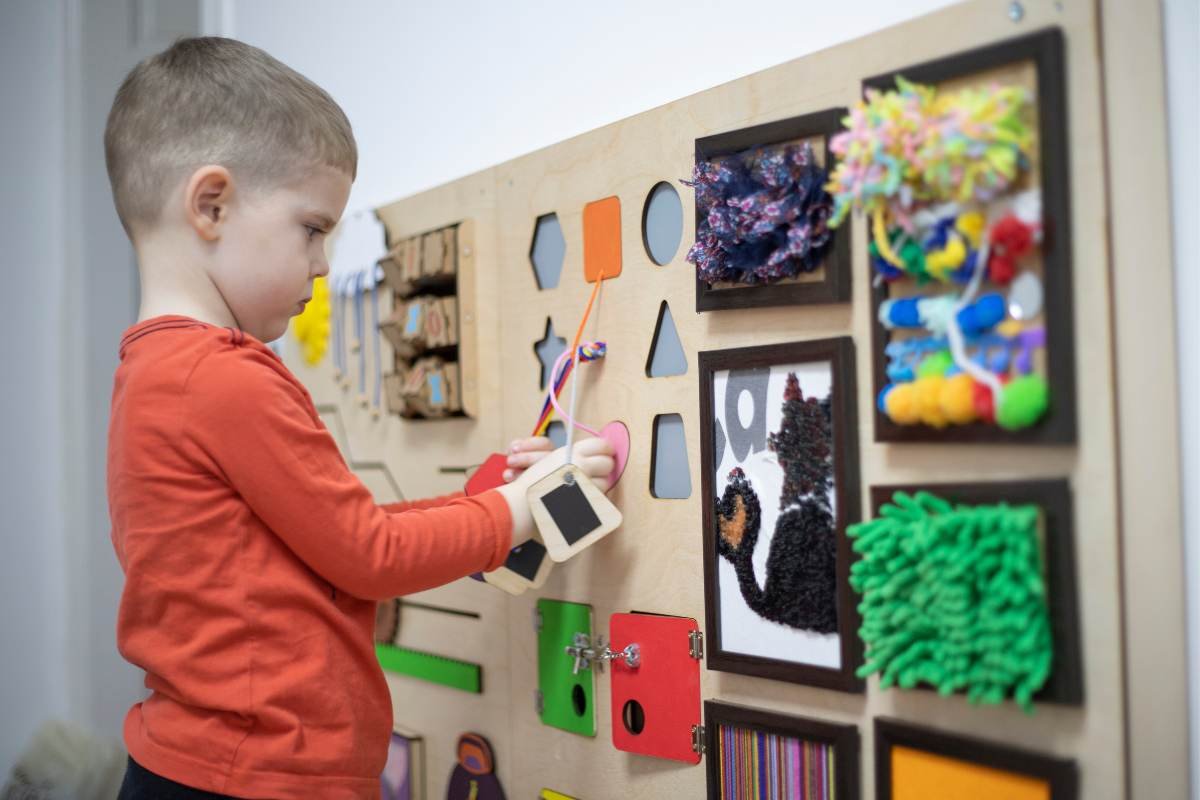The Connection Between ADHD and Sensory Processing Disorder in Children
Attention Deficit Hyperactivity Disorder (ADHD) and Sensory Processing Disorder (SPD) are two distinct neurodevelopmental conditions that affect children worldwide. These conditions often coexist, leading to overlapping symptoms and challenges. Understanding the connection between ADHD and SPD is crucial for parents, caregivers, and educators to provide the best support and interventions for children facing these complex conditions. Equally important is seeking a comprehensive evaluation, which is essential to accurately diagnose each child's unique needs, differentiate between overlapping symptoms, and develop an effective, individualized treatment plan.
What is ADHD?
Attention Deficit Hyperactivity Disorder (ADHD) is a common neurodevelopmental condition that many children experience, and it continues into adulthood. It is characterized by differences in attention, activity levels, and impulse control that can influence a child's daily life. In children, ADHD may manifest as challenges in staying focused on tasks, forgetfulness, difficulty following instructions, and a tendency to be more physically active or impulsive. These behaviors are a natural part of how some children’s brains process the world around them. While the exact causes of ADHD are still being researched, it’s understood to involve a mix of genetic, environmental, and neurological factors. Recognizing these traits as part of a neurodiverse profile helps us understand and support children in reaching their full potential.
What is Sensory Processing Disorder?
Sensory Processing Disorder, also known as Sensory Integration Disorder, is a neurological condition in which the brain gently but uniquely interprets sensory information from the environment. Every child experiences sensory input from touch, taste, smell, sight, sound, and movement, and children with SPD may experience these sensations in diverse ways. Some children are highly sensitive to certain stimuli, like loud sounds or tactile textures, and may prefer to avoid overwhelming environments. Others may seek out intense sensory input, such as spinning or touching everything around them, to feel more grounded and alert. These differences in sensory processing are valid and reflect the beautiful diversity of how brains can perceive the world. While the exact causes of SPD are still being studied, genetics and early brain development are believed to influence how sensory information is processed. Recognizing and honoring these sensory experiences allows us to provide children with the understanding, support, and strategies they need to thrive and feel confident in their everyday lives.
Overlapping Symptoms Between Sensory Processing Disorder and ADHD in Children
It's important to recognize that many children experience a blend of sensory processing differences and attentional challenges, and understanding how these can overlap helps us better support their unique needs. Both SPD and ADHD share several similar behaviors, which can sometimes make it challenging to distinguish between the two conditions.
For example, children with either condition may appear easily distracted or have difficulty maintaining focus on tasks or activities. They might seem restless, fidgety, or impulsive, often appearing to move constantly or struggle to stay seated — behaviors that are common in both SPD, especially when sensory needs are not being met, and in ADHD.
Additionally, children may have trouble regulating their responses to sensory stimuli or environmental changes. For instance, a child with SPD might become overwhelmed and exhibit sensory avoidance behaviors, like covering ears in noisy settings, which can look like inattentiveness or irritability seen in ADHD. Conversely, some children might seek out intense sensory input—such as swinging or touching objects repeatedly—which can resemble hyperactivity or impulsivity.
Both conditions can influence a child's emotional well-being, leading to frustration, anxiety, or meltdowns when sensory needs or attention demands are not being addressed. This makes it vital to view these behaviors through a compassionate lens, recognizing that they are expressions of how a child’s brain perceives and interacts with the world.
Understanding the shared and distinct characteristics of SPD and ADHD allows caregivers, educators, and professionals to create supportive, responsive environments. By validating each child's experiences and providing tailored strategies, we can help children feel understood and empowered as they navigate their unique sensory and attention needs.
The Connection Between ADHD and SPD
The link between ADHD and SPD is not entirely clear-cut, but research suggests that there might be shared underlying neurological factors. One theory is that both conditions involve differences in the way the brain processes and filters sensory information. This can result in an overactive or underactive response to sensory stimuli, leading to the observed symptoms and behaviors.
Additionally, studies have found that children with ADHD are more likely to have sensory processing difficulties compared to those without ADHD. Some researchers propose that children with ADHD may seek sensory stimulation as a way to increase their arousal levels, while children with SPD may seek sensory input for different reasons, possibly to modulate their sensory experiences.
It's also essential to note that many children with ADHD may exhibit sensory processing challenges without meeting the full criteria for SPD. Similarly, children with SPD may show attention and impulsivity difficulties without meeting the criteria for ADHD. These complexities make it crucial for professionals to conduct thorough evaluations to provide accurate diagnoses and individualized interventions.
Why a Comprehensive ADHD Evaluation is Crucial
A thorough ADHD evaluation is essential to accurately identify the child's needs and differentiate between ADHD symptoms and other possible neurodevelopemental conditions or sensory processing issues. This comprehensive assessment helps uncover co-existing conditions, such as SPD, learning disabilities, or emotional challenges, ensuring that the treatment plan is tailored specifically to the child's unique profile. Early and precise diagnosis facilitates targeted interventions, maximizes the child's potential for progress, and provides families with the necessary resources and support to manage the challenges effectively. Without an ADHD evaluation, there's a risk of overlooking underlying factors that may influence the child's behavior and development, potentially leading to not obtaining the support they need.
Addressing ADHD and SPD Together
When a child is diagnosed with both ADHD and SPD, a comprehensive treatment plan should be developed, addressing the specific challenges posed by each condition. This plan may include:
Play Therapy: Play Therapists can help children with expression of emotions, development of coping strategies, and social navigation needs. For children with ADHD, Play Therapy allows them to release pent-up energy and impulsivity while promoting self-regulation and focus through playful activities. Additionally, for those with SPD, Play Therapy enables them to explore various sensory experiences and gradually desensitize or sensitize themselves to stimuli, thereby enhancing sensory integration.
Occupational Therapy (OT): OT is a cornerstone intervention for SPD, helping children develop coping strategies and improving their ability to process sensory input.
Medication: In some cases, medication may be prescribed to manage the symptoms of ADHD, especially when they significantly impact the child's functioning.
Classroom Accommodations: Teachers and school staff can implement accommodations to support the child's learning and sensory needs in the classroom.
Multi-Disciplinary Approach: Collaboration between professionals, such as pediatricians, play therapists, occupational therapists, and educators, is essential to provide a holistic approach to intervention.
Understanding and addressing ADHD and SPD through a comprehensive evaluation and tailored intervention plan is vital for supporting a child's development and well-being. Early diagnosis and a collaborative, multi-disciplinary approach can significantly improve outcomes, helping children develop crucial skills, manage their symptoms, and thrive both academically and socially. Remember, each child's needs are unique, and with the right support, they can reach their full potential.
Find Support With an ADHD Evaluation in Middlesex, NJ
Schedule a Comprehensive ADHD and Autism evaluation to gain valuable insights and strategies tailored to your child’s needs at True Reflections. Navigate your child’s symptoms with confidence and clarity by following these three simple steps:
Request an appointment to schedule an ADHD and Autism evaluation
Begin meeting with a skilled neurodivergent affirming therapist
Gain clarity into your child’s symptoms and obtain the support they need!
Other Services Offered at True Reflections
At True Reflections Mental Health Services, I’m here to help you and your family. So in addition to providing ADHD Evaluations, I also offer Autism Evaluations, Autism and Anxiety Therapy, ADHD and Anxiety Therapy, Trauma Therapy for ADHD and Austim, Affirming Therapy for those with ADHD, Affirming Therapy for those with Autism, and Prenatal and Postpartum Therapy. I also offer different treatment modalities such as Play Therapy, Sandtray Therapy, EMDR Therapy, DBT Therapy, and more. My services are offered in both Middlesex, NJ as well as online in New Jersey and Florida. Check out my blog for more topics!
Janine Kelly, MSW, LCSW, C-NDAAP, ADHD-CCSP, ASDCS, PMH-C, RPT-S™, C-DBT, CBT-C, CCATP-CA, CATP is a neurodivergent psychotherapist and the Founder of True Reflections Mental Health Services in Middlesex, NJ. She provides support and Neurodiversity Affirming Comprehensive ADHD & Autism Evaluations to children, teens, and adults in-person and virtually in the state of New Jersey and Florida. Janine specializes in the diagnosis of ADHD & Autism in girls and women.
To request an ADHD & Autism Evaluation, please click below:




